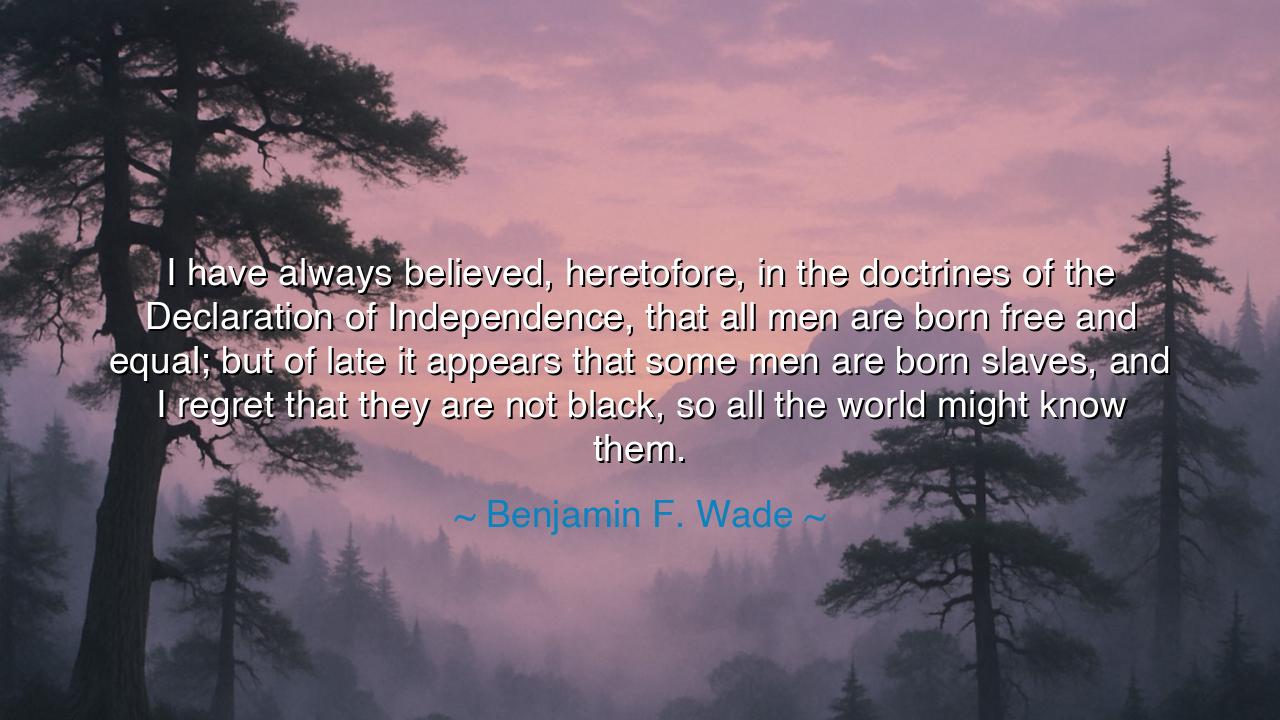
I have always believed, heretofore, in the doctrines of the
I have always believed, heretofore, in the doctrines of the Declaration of Independence, that all men are born free and equal; but of late it appears that some men are born slaves, and I regret that they are not black, so all the world might know them.






Hear, O children of the future, the words of Benjamin F. Wade, whose voice echoes the deep struggle for freedom and equality that has shaped the course of human history. "I have always believed, heretofore, in the doctrines of the Declaration of Independence, that all men are born free and equal; but of late it appears that some men are born slaves, and I regret that they are not black, so all the world might know them." These words are both a lamentation and a powerful challenge to the principles upon which a nation was founded. Wade speaks not only of the ideals of equality and freedom, but also of the bitter reality that some are still enslaved—not by chains, but by forces that strip them of their autonomy and their dignity.
In the ancient world, the pursuit of freedom was not a simple matter. The Greeks, who gave birth to the idea of democracy, understood the tension between freedom and subjugation. Yet, even in their most enlightened cities, like Athens, only a portion of the population was free. Slaves—captured in battle or born into servitude—were excluded from the rights that citizens took for granted. The great philosopher Aristotle himself wrote of the "natural" order of some being born to rule and others to serve. This idea was a reflection of the hierarchies that pervaded ancient societies, where inequality was often justified as a natural condition. But even in those times, there were thinkers and voices, like Socrates, who challenged these assumptions, asking whether freedom and equality could ever truly coexist in a world that accepted slavery.
Wade’s lament is a modern echo of these ancient struggles—a recognition that the ideals of the Declaration of Independence have not always been realized in practice. The Declaration boldly declares that all men are created equal, yet Wade points out the contradiction in a society where certain people are still treated as less than human, where some are born into lives of oppression and servitude. His words, though spoken in a particular historical context—the era of slavery in America—resonate beyond that time, calling attention to the ongoing struggles for justice and equality that persist today.
Consider the Civil War, when the American Union fought not only for its survival but for the very principles upon which it was founded. Abraham Lincoln, the great leader of that time, spoke of a nation conceived in liberty and dedicated to the proposition that all men are created equal. But the reality of slavery—an institution that had existed for centuries—stood in stark contrast to the ideals of freedom and equality that Wade so passionately defended. The Emancipation Proclamation was a powerful step toward rectifying this moral wrong, but Wade's words reflect the deeper regret that a nation could ever accept the idea that some could be born into slavery while others enjoyed freedom by birthright.
The lesson in Wade’s words is one of profound importance, O children: freedom is not a given, nor is equality something that happens by accident. They must be fought for, protected, and, most importantly, lived out in the lives of all people, regardless of their birth, race, or station. Wade challenges us to confront the uncomfortable reality that, while some may be born with the privilege of freedom, others are not, and the world must take notice. It is the role of the citizen to recognize and call out these injustices, for as long as inequality exists, the ideal of freedom will be a mere shadow of its potential.
So, O children, take heed of this lesson: recognize the inequalities that still persist in the world, whether based on race, gender, class, or any other factor, and challenge them. Just as Wade decried the existence of slavery in a society that claimed to value freedom, so too must you stand against any form of oppression or injustice. Let the words of Wade guide you to see that equality is not simply a principle to be admired from afar, but one to be actively pursued. Freedom and equality must be woven into the very fabric of our lives, in our laws, and in our hearts.
Lastly, as you go forward in your journey, remember this: to truly honor the ideals of freedom and equality, you must work not only for your own liberty but for the liberty of all. Just as Wade believed that freedom could not be fully realized until all men were free, so too must we strive for a world where no one is left behind, no one is born into servitude, and no one is denied the full benefits of being born free. Let your actions be a testament to the idea that freedom is a universal right, and that each day is an opportunity to fight for that equality. May your lives reflect the deep commitment to justice, to liberty, and to the shared humanity that connects us all.






AAdministratorAdministrator
Welcome, honored guests. Please leave a comment, we will respond soon